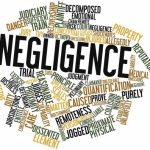One of the most frequently heard bits of “legalese” used when talking about a personal injury (for example, from the result of a car accident) is the word “negligence.” In day to day conversation the word “negligence” is usually used to refer to a failure to use proper care in doing something. Once we move into the legal arena, the common usage of “negligence” is only part of the battle. Negligence, in a legal sense, is a legal conclusion reached by 1) determining that there was a duty to act a certain way, 2) showing that duty was breached, and 3) that that breach of duty was the cause of the damages suffered by the injured party.
The first question to ask when trying to determine if a party was negligent is whether or not some duty existed. Usually this is a duty to do something, like the duty to ensure a clear path of travel when driving. Sometimes it can be a duty NOT to do something, like the duty to NOT follow too closely when driving in traffic. Whether or not a duty was violated is heavily dependent on the specific facts of a given situation.
If there was duty, we must determine if it was breached. For a duty to be breached, the person with that duty must have done something contrary to what would normally be expected from them if they followed their duty. For example, if a driver has a duty to stop at a stop sign before continuing through an intersection and the driver fails to come to a complete stop, that driver is said to have breached that duty.
Finally, the damages caused to the injured party in a negligence action MUST be caused by a breached duty. It’s worth noting that even with the existence of a breached duty, a claim with no damages has very little chance of success in the Commonwealth of Viginia.
If you’ve been injured by the negligence of another person, the experienced and professional attorneys at Winslow & McCurry, PLLC can help! Call us at (804) 423.1382 to set up a FREE personal injury consultation.
